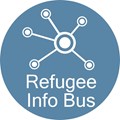Story
On the UK border in Northern France, the situation for the past few years has been a relentless stalemate between the authorities and refugee communities. Though it is now three and a half years since the Calais Jungle camp was destroyed, refugees continue to arrive in the region. With no centralised camp, individuals are scattered across the town, finding temporary shelter wherever they can: in forests, industrial parks and beneath hedges. These smaller camps scattered around the port town are routinely cleared and evicted, sometimes daily. Against the backdrop of Brexit, Calais is being enclosed in walls, preventing refugee communities from sleeping under bridges or in fields around the city. Accessing the French asylum system from Northern France is not possible, and requires people to travel to other regions of France where there are lengthy waiting periods. In Paris, thousands of refugees and migrants are sleeping on the streets, trying to access this system. In Calais and Dunkirk, refugees are risking their lives daily to cross the Channel in trucks, and increasingly, dinghies and small boats.
We continue to provide refugees and displaced people in the region with Wi-Fi and phone charging facilities; safety advice; access to UK and French legal advice; multilingual human rights workshops; and regularly updated info sheets about options available for people who are in detention, or who are considering claiming asylum in France or the UK, as well as a guide to services available in the region (all of which are checked and updated by our network of European legal professionals). We always try to encourage our service users to claim asylum in France, or make legal applications for family reunion, actively dissuading people from making dangerous journeys to the UK, via dinghies. Our close-knit team of online cultural mediators and translators ensure that all information is provided in 7 different languages, which reflect the diverse population of refugees and displaced people in Calais and Dunkirk. Hundreds of refugees meet with our team to understand their rights, discuss their plans, as well as to call their family and/or access the Internet.
We provide the internet in mobile vans, with technology that can comfortably deal with around 100 connections at any one time. Living homeless as a refugee is fraught with anxiety, loneliness, and danger. Making contact with parents, partners or children that have been left behind at home, or even stranded in transit countries can relieve this tension slightly. Every day, we see the positive effects that our service has on our beneficiaries wellbeing.
COVID-19 really does reiterate how during times of crisis and panic, people must have access to the right information, delivered at the right time and in the right way. This is something that we have known painfully well, providing information to refugees in Greece, the UK and the UK border with Northern France during these past four years.
Despite being busier than ever online, and having our resources stretched further, we have not been eligible for any UK government support or larger COVID-19 emergency grants during this crisis and we have seen a significant decrease in our fundraising revenue due to many festivals, parties and events being cancelled.
All donations will go towards keeping our bus and volunteers on the ground in Northern France continue their face(mask)-to-face(mask) field operations in Northern France!
We would be deeply grateful for a grant to enable us to continue our face(mask)-to-face(mask) field operations in Northern France!
 Campaign by
Campaign by 